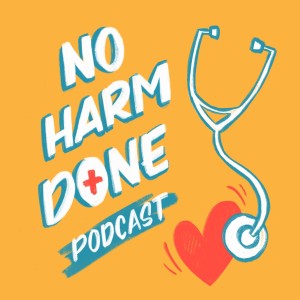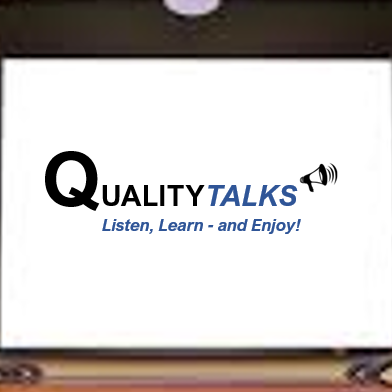Episodes

Wednesday Oct 09, 2019
Wednesday Oct 09, 2019
In early 2019 Glenda Gorrie was looking forward to the next stage of her life, having 'retired' from full-time work at the end of 2018.
What she didn't expect was to be diagnosed with pancreatic cancer.
In this two-part conversation, we roam around her encounters with the health system, observing the 'person-centred care' aspects through the lens of Glenda's long clinical and policy-making experience with improving healthcare safety and quality.
Part 2 touches on issues with connected - or disconnected - care and what happens when you don't play the role of the 'good' patient; and we question if patient advocates are the answer and whether or not Glenda considers herself a consumer. Finally, she distils what's really important: and it won't cost you a thing to implement!
Music credit: Fred Kinck-Petersen, sourced from the WavePad sound library.

Wednesday Oct 09, 2019
Wednesday Oct 09, 2019
In early 2019 Glenda Gorrie was looking forward to the next stage of her life, having 'retired' from full-time work at the end of 2018.
What she didn't expect was to be diagnosed with pancreatic cancer.
In this two-part conversation, we roam around her experience of person-centred care through the lens of Glenda's long clinical and policy-making experience with improving healthcare safety and quality.
Part 1 describes Glenda's early encounters with her care and treatment 'wrapped in person-centredness' that didn't last quite as long as she'd hoped! We discuss how organisational structures and systems can be a barrier to person-centred care, and how it's not only clinicians we need to be person-centred. Lots of small tips and observations that add up to big and important messages about what's really important to the patient - and how you can find out more about what your consumers really want from your service.
Music credit: Fred Kinck-Petersen, sourced from the WavePad sound library.

Monday Dec 31, 2018
Monday Dec 31, 2018
Join the Cathys as we enjoy our tenth episode, including a special reading from Balding's new book The Point of Care - and musings on why we're not further ahead with the quality of care after all these years. Plus - tips on shaking up your role for more satisfaction and effectiveness!

Sunday Dec 02, 2018
Sunday Dec 02, 2018
To make a powerful case for change, you need to know the components of a high performing quality system, what it should be achieving, be able to demonstrate where your system sits in relation to that, and show the benefits for your consumers and organisation, to make a case for change. If that sounds exhausting! - and you'd like a simple way to do this - read on.
After having more conversations about this than I can count, I’ve distilled my research and experience about what it takes for a quality system to drive great care into a One Page Quality System Performance Assessment Tool (QPAT). If you don't have the tool, find it here.
This is something you and others in your organisation can complete in 5 minutes to make your case for change. It’s a simple way to get the influencers and decision-makers on the same page about where you are and where you’d like to go in 2019, and helps you determine the more specific shifts you need to make to really focus on point of care.
The tool gives a snapshot of the key results an effective, mature quality system should be achieving. It’s a tool for clarifying what a high performing quality system looks like and developing a shared understanding in your organisation about the core components of an effective quality system; as well as your strengths and gaps; and what you need to do to get closer to great care for every consumer.

Wednesday Nov 28, 2018
Wednesday Nov 28, 2018
If you could draw your progress since January 2018 towards great care for every consumer of your services on a map, what would it look like? What would I see? A deliberate road to a clear destination, over which significant distance has been travelled? A meandering series of side-trips? A few break-downs when you’ve been stuck in one spot for a while and took a while to get going again? Or are you pretty much bogged down in the same place now as you were at the start of the year?
I've distilled the lessons from my research and working with hundreds of health and human services to identify the starting point for change. In this Part 1 of 2 these short Qualityclass videos (or audios) on accelerating your progress in 2019, I’ll show you one shift you can make that will get more positive engagement with staff in quality and compliance.
If you want to be able to say you made new standards and compliance requirements work more positively for your organisation; to point to significant progress with care and service quality; to show increased staff engagement; and demonstrate growth in your own leadership and role satisfaction.
Commit to the right shift in the way you currently do things, and you’ll be on the road to achieving this.

Wednesday Apr 25, 2018
Wednesday Apr 25, 2018
No Harm Done is a new aspect of QualityTalks and is my podcast with Cathy Jones (ED Quality at Healthscope.) It's all about improving, exploring, understanding and getting on with healthcare safety and quality, and is designed to give you tips, ideas and guidance if you’re working in the area of quality & risk management. Includes segments on FAQs, Quality MythBusters, Too Long Didn't Read and Quality Hacks. This is Episode 3: 'Congratulations, you're a Quality Manager!'

Tuesday Apr 17, 2018
Tuesday Apr 17, 2018
Join the Ambulance Victoria Quality and Patient Experience Team as they explain the why, what and how of their strategic approach to creating Best Care for every ambulance patient, every time. What does it take to get everyone on the same page and wanting to provide a consistent standard of care in a state-wide organisation? AV is in the process of finding out! And check out their strategic plan overview, showing how their 'Patient Care Commitment' to Best Care is integral to what AV is all about.

Sunday Nov 05, 2017
Sunday Nov 05, 2017
In 2017 Maree Cameron PSM was awarded the Victorian Public Sevice Medal for her outstanding contribution to improving aged care. Her considerable experience and achievements in this area give her a fascinating perspective on what's important about aged care, how it can be improved and where to from here for creating high quality care and experiences for every resident.
After leaving the Department of Health and Human Services in 2017, Maree reflects on the impact of working in aged care on her career, considers the quality of care vs quality of life discussion, emphasises the importance of agreeing a universal definition of high quality aged care, and highlights the need for a national organisation to inform, support and drive safe and high quality care for every resident.
Even though this is pre-Royal Commission, her thoughts are as relevant as ever - and fascinating in light of everything that's happened since 2017.
I'm very sad to report that Maree died in January 2024. This makes her interviews all the more important as part of her huge legacy that lives on.

Sunday Nov 05, 2017
Sunday Nov 05, 2017
Maree Cameron PSM received the Victorian Public Service Medal in 2017 for her significant contribution to improving residential aged care. (She and I discuss her thoughts on quality and safety in residential aged care in a separate interview.) Over a long career focused on improving quality of care and life for residents, she has amassed considerable knowledge about what this takes.
So does this knowledge help - or hinder - when you're the one receiving care? Maree has had multiple encounters with the acute care sector over the past few years as a patient, and kindly agreed to share her thoughts on being on the 'other side of the bed'. In this interview we discuss what patient-centred care means to an informed patient who knows what it 'should' be and how it is defined from the provider perspective; but is this really what patients need - or want?
I'm very sad to report that Maree died in January 2024. This makes her interviews all the more important as part of her huge legacy that lives on.

Saturday Aug 26, 2017
Saturday Aug 26, 2017
Mel Wityk is the Nurse Unit Manager on a subacute ward at Western Health: a large multi campus teaching health service in Melbourne. Since 2013 Mel and her team, together with allied health and medical clinicians and ably supported and inspired by the WH wound consultant, Col Killmier, have been on a mission to achieve zero pressure injuries - and stay there. When I interviewed Mel the ward had gone 525 days pressure injury free.
How did they do it?
This QualityTalks started out exploring Mel's leadership role in preventing pressure injuries, but I soon realised that there's a lot more going on here. Over our discussion, Mel shows how she used every key change strategy in the book - without reading the book! - including: a clear and shared goal, a human connection, Start Where They Are, people support what they help to create, feelings drive action, leading by example, clear roles and expectations, smoothing the path, removing the old way, monitoring and learning, embedding change in the every day, celebrating wins and staying the course.
By the end of this QualityTalk it's clear that leading sustained change that makes life better for patients and staff is not something that takes years of study if you're clear about where you're going and where you're starting, and go on the journey together. And it helps if along the way you're prepared to listen, learn, practise a little genuine empathy for the needs of others - and have some fun!
And what happened after day 525? You'll have to listen to find out!
